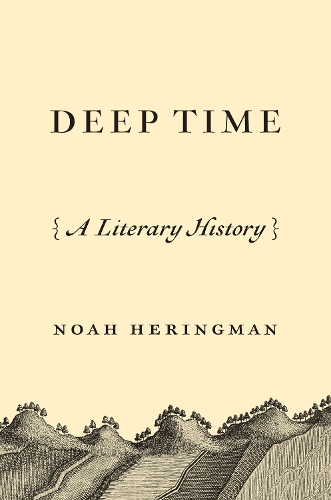
Deep Time: A Literary History
(Hardback)
Available Formats
Publishing Details
Deep Time: A Literary History
By (Author) Noah Heringman
Princeton University Press
Princeton University Press
15th January 2023
United States
Classifications
Tertiary Education
Non Fiction
Western philosophy: Enlightenment
History of science
Astronomy, space and time
Geology, geomorphology and the lithosphere
820.9005
Physical Properties
Hardback
320
Width 156mm, Height 235mm
Description
How the concept of deep time began as a metaphor used by philosophers, poets, and naturalists in the eighteenth and nineteenth centuries
In this interdisciplinary book, Noah Heringman argues that the concept of deep timemost often associated with geological epochsbegan as a metaphorical language used by philosophers, poets, and naturalists of the eighteenth and nineteenth centuries to explore the origins of life beyond the written record. Their ideas about the abyss of time created a way to think about the prehistoric before it was possible to assign dates to the fossil record. Heringman, examining stories about the deep past by visionary thinkers ranging from William Blake to Charles Darwin, challenges the conventional wisdom that the idea of deep time came forth fully formed from the modern science of geology. Instead, he argues, it has a rich imaginative history.
Heringman considers Johann Reinhold Forster and Georg Forster, naturalists on James Cooks second voyage around the world, who, inspired by encounters with Pacific islanders, connected the scale of geological time to human origins and cultural evolution; Georges-Louis Leclerc, Comte de Buffon, who drew on travel narrative, antiquarian works, and his own fieldwork to lay out the first modern geological timescale; Blake and Johann Gottfried Herder, who used the language of fossils and artifacts to promote ancient ballads and prehistoric song; and Darwins exploration of the reciprocal effects of geological and human time. Deep time, Heringman shows, has figural and imaginative dimensions beyond its geological meaning.
Reviews
"An excellent book, Deep Time historicizes the important topics of deep time and the Anthropocene. With an extraordinary range of reference, from Buffon to J. G. Ballard, Noah Heringman shows the warp and woof of deep time through key texts and brings the past into present relevance."--Gillen D'Arcy Wood, author of Land of Wondrous Cold: The Race to Discover Antarctica and the Secrets of Its Ice
"Heringman offers a brilliant counterhistory of the geological imagination, showing how speculation about humanity's deep past, as recorded in ancient myths, monuments, and migrations, inspired a revolutionary new way of envisaging the scale of Earth history. As we seek forms of knowledge adequate to the Anthropocene proposal, Heringman invites us to reconsider those predisciplinary modes of inquiry, such as scientific romance and philosophical anthropology, that first sought to situate human antiquity in the tumult of planetary time."--Tobias Menely, author of Climate and the Making of Worlds: Toward a Geohistorical Poetics
Author Bio
Noah Heringman is Curators Distinguished Professor of English at the University of Missouri. He is the author of Romantic Rocks, Aesthetic Geology and Sciences of Antiquity: Romantic Antiquarianism, Natural History, and Knowledge Work.
